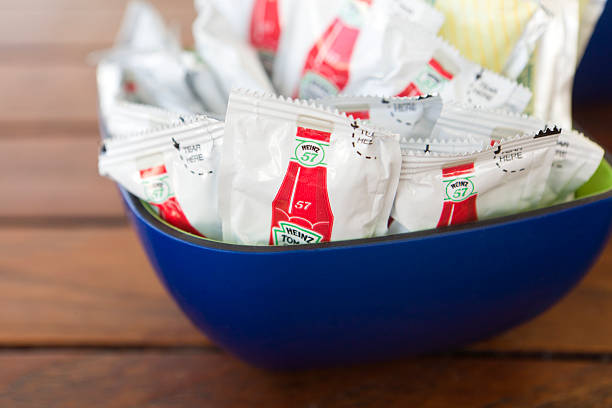Ketchup, a condiment traditionally associated with french fries and burgers, has recently garnered attention for a surprising new role — as a potential source of energy for runners. Heinz, a leading ketchup manufacturer, has even launched an advertising campaign claiming that individual ketchup packets can serve as a convenient and cost-effective mid-run snack. However, before you start envisioning ketchup-fueled marathons, let’s delve deeper into the perspective of sports nutrition experts who are skeptical about this unconventional trend.
The Running on Ketchup Trend
Online discussions regarding the use of ketchup as running fuel have been circulating for a while, with some runners considering it as a substitute for pricier energy gels. Heinz, seizing the opportunity, boldly asserts that “runners everywhere are using Heinz ketchup on their runs.” The company has gone a step further by creating pre-set running routes in major cities, encouraging runners to refuel at restaurants that stock Heinz ketchup packets. Advocates argue that the carbohydrates in ketchup, approximately 2 grams per 9g packet, can provide a sustained energy boost for distance athletes.
What the Experts Say
Sports dietitians, however, strongly caution against the use of ketchup as a primary source of running fuel. According to guidelines from the Academy of Nutrition and Dietetics, Dietitians of Canada, and the American College of Sports Medicine, athletes engaged in exercises lasting longer than 60 minutes should consume 30 to 60 grams of carbohydrates per hour. For activities exceeding 2.5 hours, such as marathons or triathlons, the recommended carbohydrate intake increases to 60 to 90 grams per hour.
Why Ketchup Falls Short
- Insufficient Carbohydrates: While ketchup packets do contain carbohydrates, the amount needed for sustained energy during long runs is impractical. Seattle-based sports dietitian Steph Magill emphasizes that runners would have to consume a considerable number of packets to meet their energy needs adequately.
- High Sodium Content: Ketchup packets are also high in sodium, with 90 milligrams each. Overconsumption can lead to an intake significantly exceeding daily recommendations. For endurance athletes, replenishing sodium losses is essential, but ketchup packets provide more than necessary, potentially reaching 59 percent of the daily recommended value.
- Lack of Essential Electrolytes: Ketchup lacks essential electrolytes such as calcium, magnesium, and potassium, crucial for maintaining a healthy blood pressure range. Specially formulated sports beverages and gels offer a balanced blend of electrolytes, unlike ketchup.
- Acidity Issues: The high acidity of ketchup could pose gastrointestinal (GI) problems. Acidic foods may irritate the stomach lining, leading to pain or an upset stomach. For athletes prone to GI issues during long runs, the acidity of ketchup could exacerbate the problem.
- Quantity and Practicality: Consuming the necessary amount of ketchup for optimal energy intake during a run is both impractical and unappetizing. To reach the 30-60 grams of carbohydrates recommended per hour, a runner would need to ingest an unrealistic number of ketchup packets, making the strategy neither feasible nor enjoyable.
Nutrition Tips for Runners
In the pursuit of peak performance, runners should focus on a well-rounded nutrition plan. Here are some essential tips for optimizing your running nutrition:
- Hydration is Key: Staying hydrated is crucial for optimal performance. Dehydration can lead to fatigue, cramps, and diminished endurance. Aim to drink water consistently throughout the day and consider electrolyte-rich beverages for longer runs, especially in hot and humid conditions.
- Carbohydrates are Fuel: Carbohydrates are the primary energy source for endurance activities. Incorporate complex carbohydrates like whole grains, fruits, and vegetables into your meals to ensure sustained energy levels during your runs.
- Protein for Recovery: Protein plays a vital role in muscle repair and recovery. Include lean protein sources such as chicken, fish, beans, and nuts in your post-run meals to support muscle recovery.
- Balance Macronutrients: Achieving a balance of macronutrients (carbohydrates, proteins, and fats) is essential. This balance provides sustained energy, promotes muscle repair, and helps maintain overall health.
- Timing Matters: Pay attention to the timing of your meals, especially before a run. Consuming a balanced meal a few hours before running can provide the necessary energy without causing discomfort.
- Avoid High-Fat Foods Pre-run: While healthy fats are an essential part of a balanced diet, they can cause gastrointestinal discomfort if consumed too close to a run. Opt for easily digestible, low-fat snacks before hitting the pavement.
While the idea of using ketchup packets as a running fuel might sound convenient, it’s not a practical or effective solution for endurance athletes. The high volume required to meet carbohydrate needs brings challenges such as excessive sodium intake, lack of essential electrolytes, potential GI distress, and overall impracticality. Sports dietitians unanimously advise against relying on ketchup and suggest opting for easily digestible, high-carbohydrate foods like dried fruit, crackers, bananas, or granola bars. So, before you embark on your next long run, think twice before reaching for that ketchup packet – your stomach will likely thank you. As the saying goes, some trends are best left in the condiment aisle.
